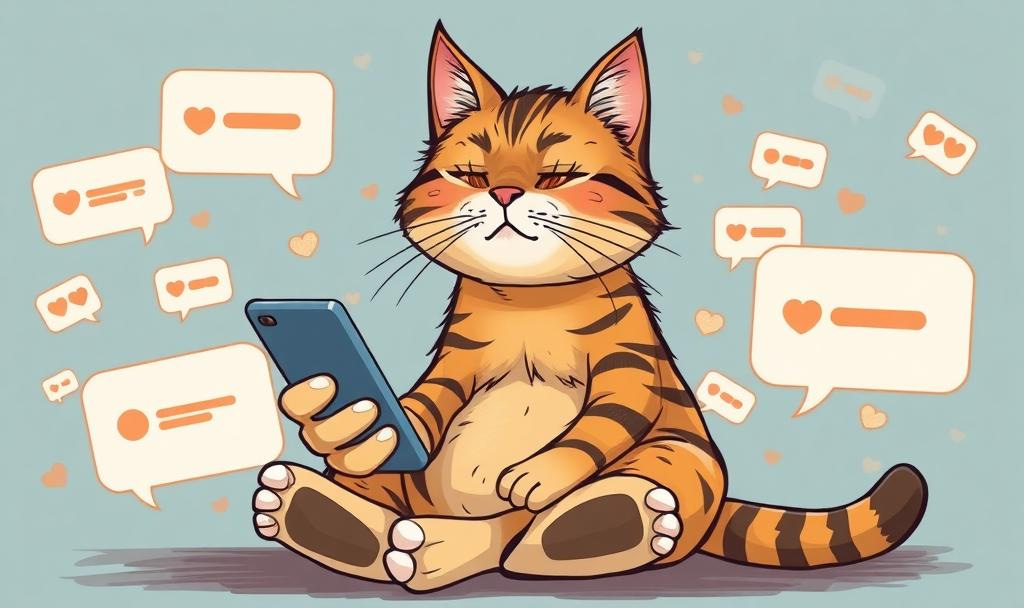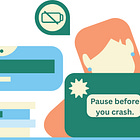Trauma Dumping Is Not a Group Chat Strategy
When venting turns into an emotional ambush.
Hey, checking in, because the quiet stuff matters too.
Today’s reflection: what happens when “sharing your truth” stops feeling like connection, and starts feeling like emotional hostage-taking in the group chat.
I’ve been thinking a lot about trauma dumping lately, or, as I sometimes jokingly call it, “trauma dumbing.” It’s that moment when we offload our raw, unfiltered pain onto friends, acquaintances, or a group chat without warning, context, or consent. It’s less about connection and more about urgency: a sudden emotional download that leaves both the sender and the recipients reeling.
Case in point: the other night, I was scrolling through one of my usual group chats — mostly memes, debates about pineapple on pizza, and the occasional existential joke — when suddenly, a friend dropped in with a novel. I’m talking 60 paragraphs, no punctuation in sight, a full cinematic universe of hurt delivered in blue bubble form.
It wasn’t that I didn’t care. I did. But the whiplash was real. One second we’re arguing about the superior pizza topping, the next we’re ankle-deep in someone’s family trauma. And that’s when I realized: trauma dumping feels urgent to the sender, but confusing, even exhausting, to everyone else.
Oversharing blurs intimacy lines
We live in a world that encourages constant disclosure. Social media rewards oversharing, threads glorify confessions, and platforms subtly train us to narrate every moment of our lives, including breakdowns.
Sharing vulnerability is beautiful. But trauma dumping? That’s different. It’s urgency without context, intimacy without consent. It blurs the line between real connection and emotional ambush. Sometimes it comes from the struggles we don’t see, the slow build before the emotional cliff, but the impact on others is still the same: friends can feel obligated, overwhelmed, or even resentful.

When friends feel ambushed
When someone trauma dumps in a chat, it leaves everyone else in a weird limbo:
Do we stop scrolling, drop everything, and become instant therapists?
Do we react with a heart or thumbs-up and hope that’s enough?
Do we ghost, feeling guilty but relieved?
None of these feel satisfying, especially the last one. Instead of fostering intimacy, trauma dumping can unintentionally create distance. Friends retreat. Acquaintances withdraw. The group chat, meant to be a space for laughter and light banter, becomes emotionally heavy territory.
I’ve been on both sides of this. I’ve trauma dumped, sending a word-vomit vent I immediately regretted. And I’ve been the recipient, staring at my phone, unsure whether to reply with empathy, advice, or a well-timed Nene Leaks meme. Both sides come with a side of shame.
Story time: me, my meltdown, and the group chat
A few years ago, I had what we’ll call a “spiral.” Work was chaos, sleep was nonexistent, my personal life was unraveling, and everything felt sideways. So in panic, I did what any rational human would do: opened the group chat and… trauma dumped.
Twenty minutes later, I looked at what I’d sent: a breathless essay about work and home anxieties, complete with crying emojis, exclamation points, and several unhinged metaphors.
The replies trickled in. One friend sent “I’m so sorry ❤️.” Another sent a meditation app link. One didn’t reply at all.
Instead of relief, I felt exposed; like I’d flung my insides onto a digital table and everyone was politely pretending not to notice. The paradox hit me hard: dumping feels urgent, but afterward, it often leaves both sides emotionally raw.
Why we do it
If trauma dumping doesn’t actually soothe, why do we do it? A few reasons:
The urgency of pain. When emotions are high, we want them out of our bodies now.
Blurred digital boundaries. Typing feels safer than speaking face-to-face, so the chat becomes a temporary therapist.
Mistaking venting for intimacy. We think unloading equals closeness, but intimacy actually requires consent.
The culture of constant narration. If life is always content, why not narrate the breakdown too?
A smartphone chat screen showing an imbalanced conversation. On one side, multiple long, stacked chat bubbles fill most of the screen, symbolizing oversharing or venting. On the other side, only one tiny reply bubble appears, small and hesitant. Minimal, modern illustration style with soft, muted colors. Focus on the contrast between overwhelming and quiet.
Trauma dumping vs. healthy sharing
Here’s the key distinction:
Trauma dumping: unfiltered overshare, no warning, expects others to hold it all.
Healthy sharing: context, consent, reciprocity. For example:
“Hey, I’m going through something rough. Do you have the bandwidth to hear it?”
That one sentence — “Do you have the bandwidth?” — changes the dynamic entirely. It transforms a monologue into a dialogue and gives friends agency instead of ambushing them.
Think about it this way: over text, trauma dumping can feel like an unskippable ad that suddenly takes over your whole screen. But it happens on the phone too. You answer a call, say hello, and before you’ve even settled in, your friend sounds frantic. You ask, “What’s wrong?” and suddenly you’re holding an avalanche of unfiltered pain you weren’t braced for.
That’s the difference consent makes. Do you have the bandwidth? might sound awkward at first, but with a little practice, it becomes part of your digital (and real-life) communication toolkit. It’s less about formality and more about respect: letting someone know you value their capacity as much as you value their care.
The cost of constant dumping
When trauma dumping becomes the default, it takes a toll:
Compassion fatigue: Friends burn out. They care, but they’re drained.
Shame cycles: The dumper feels exposed afterward, fueling more spirals.
Fragile friendships: Relationships bend under the weight of one-sided sharing.
Erosion of safe spaces: The group chat becomes a place of dread, not comfort.
The cost isn’t just in the big blow-ups; it’s also in the tiny things that wear us down: the constant guilt, the compassion fatigue, the slow erosion of joy in the chat. The very tool meant to connect us becomes the thing that distances us.
What to try instead
So if trauma dumping isn’t a group chat strategy… what is? Some softer approaches:
1. Add context.
“Hey, can I vent for a minute?” or “Want the short or long version?” signals respect and lets others opt in.
2. Time it.
Not every spiral needs to hit the chat immediately. Journaling first or waiting until a more suitable moment saves everyone from regret.
3. Reciprocity.
Friendship is a two-way street. If you vent, also make space to listen. Emotional generosity sustains relationships.
4. Diversify your outlets.
Not everything belongs in a chat. Journals, therapy, voice notes, or screaming into your car (it works) can absorb the overflow.
5. Name your need.
Do you want advice, a witness, a distraction? Saying it out loud helps friends show up appropriately.
What it looks like in real life
Instead of:
“Everything is ruined and I’m broken and my boss hates me and I’ll never sleep again and I think I’m fundamentally unlovable.”
Try:
“Hey, rough day. Do you have the space for me to vent a little?”
Or even:
“Can I get a distraction meme? My brain is spiraling.”
Sharing is still real. Trauma dumping is not. The difference is subtle but crucial: boundaries, context, and consent make all the difference.
In case you need to hear it
You’re not a bad friend if you’ve trauma dumped before. We all have.
You’re not selfish for needing support. You just deserve to ask for it in a way that feels safe for both sides.
Your pain is real, but so is your power to share it gently. (Operative word “gently.”
My own check-in this week
One thing that grounded me:
Reheating leftovers that somehow tasted even better the second time around.
One thing that ungrounded me:
Discovering (again) that reheated coffee tastes like regret in a mug..
Your turn: what’s one small choice, grounding or ungrounding, that shifted your week?
If you’re new here, welcome to Joydify, your soft landing for the quiet stuff that matters.
Thanks for subscribing to Joydify and sharing a quiet moment with us. Here’s to gentle support, one check-in at a time.




